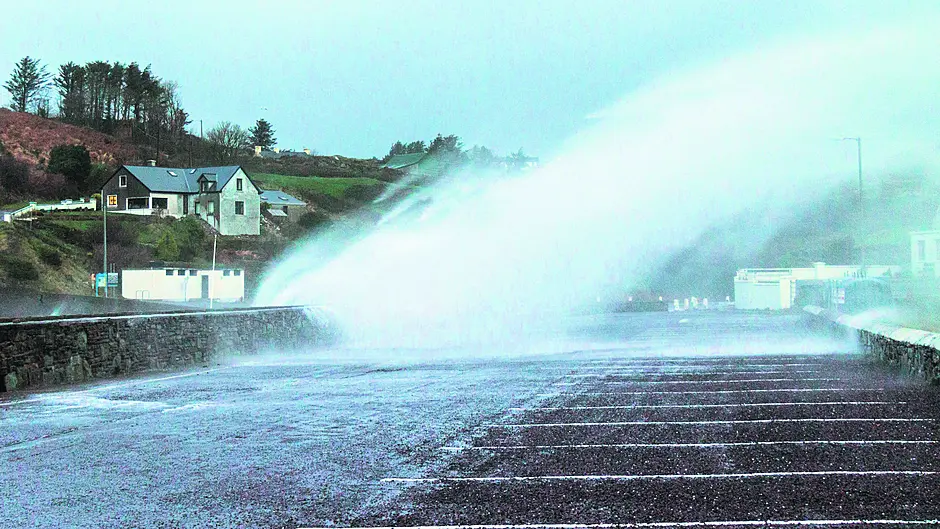Cork County Council has revealed some worrying statistics as it publishes data collected for a report to help formulate policy
CLIMATE change in recent years has led to some worrying and unwelcome trends in Cork county, with new findings showing that in West Cork the flooding of Rosscarbery in 2020, which involved 230mmm of rainfall, was the highest recorded since 1961.
It also found that the highest temperature on record in Cork was 31.6C, which was recorded in Glengarriff on June 18th 2018. There have been 15 extreme weather events affecting the region since 2017, including Hurricane Ophelia, Storm Emma, and five separate heatwaves.
The findings are part of a baseline evidence summary report for Cork County Council’s new Climate Action Plan, which was revealed at a Council meeting last week.
It examined how the climate in Cork county has changed in recent decades, while also showing the risks of impact that future climate change may cause.
The report also predicts an increase in the average temperature of between 1.1 and 1.5 degrees Celsius for Cork county by 2050, resulting in an increase in heatwaves and droughts.
Coastal flooding and erosion is likely to become more frequent, too, unless action is taken to reduce emissions.
Councillors said that this plan will only work effectively if there is sufficient ‘buy in’ from the communities across the county, while the Council is seeking public engagement on the first stage of this Climate Action Plan. They have until February 24th 2024 to adopt a climate action plan.
Louis Duffy, director of services, explained that the local authority is required to have extensive climate action planning.
‘It’s extremely important, in the short timeframe of 12 months, that we get full involvement from members, from communities and from all of the sectors across the county,’ he said.
‘The Climate Action Plan must reflect the local and regional context of Cork County Council and develop a relevant climate action evidence base, as well as reducing emissions in line with the 51% target prescribed to 2030.’
The Council is seeking public engagement on the first stage of the plan for the county, and the consultation will inform how they can best tackle the challenges posed by the changing climate.
Cllr Anthony Barry (FG) said this is the biggest challenge this generation is facing and the climate change issue is going nowhere.
‘The volume of work that needs to get done for this plan is huge and without the buy-in of the local community, it is doomed to failure and we really need to bring the people living in Cork county along with us on this,’ said Cllr Barry.
Cllr Frank O’Flynn (FF) described it as the most ‘important piece of documentation’ brought before them in many years and called for public meetings to be held in each municipal district about this plan.
Cllr Alan O’Connor (GP) said it will be a challenge, but it is up to them as councillors to get it across the line and they, as councillors, can drive the ‘buy-in’ in the community.
At a meeting in Goleen later this week county mayor Danny Collins will pose a question to the executive about erosion on Whiddy Island which, he says, has made the road dangerous for both pedestrians and motorists.
The final plan, when published, will show how the Council can work to influence, facilitate and co-ordinate the climate actions of communities and other stakeholders.
Members of the public are being asked to make submissions on how the Council can best transition to a climate resilient, biodiversity rich, environmentally sustainable and climate-neutral economy.
The Baseline Evidence Summary report is available online at www.corkcoco.ie and submissions can also be made up to Sunday May 21st inclusive, while Cork County Council is required by statute to adopt the plan before February 24th 2024.
MAIN HIGHLIGHTS OF THE CLIMATE REPORT
• The highest temperature on record was recorded on June 18th 2018 at llnacullin, Glengarriff.
• Sea levels in the Cork harbour area have risen by approx 40cm since 1942. 230mm of rain fell during the 2020 Rosscarbery flood, which was the highest recorded since 1961. This resulted in extensive flash flooding on the N71 at Rosscarbery, R-597 at Roury bridge and other roads around the Clonakilty, Dunmanway, Bantry and Sheep’s Head areas. It resulted in damage to roads and properties which incurred heavy repair costs for the Council.
• Wind (Storm Barra, Dec 21) resulted in coastal flooding which impacted 23 premises in Bantry, while roads were in a treacherous condition with over 100 fallen trees reported and surface water flooding at multiple locations.
• Coastal flood caused by Storm Ellen in August 2020 resulted in the ESB reporting that 40,000 premises across the county were left without power, particularly around Schull, Bantry, Skibbereen, Clonakilty and Dunmanway. Water supply was disrupted while flooding was reported in Skibbereen, Kinsale, and Bantry.







